
Nov 17 2022 How to Talk with Your Grandchild about Becoming B-Mitzvah
Being a Bubbe (or Grandpa, Nana, Zayde, Grammy — or whatever your grandparent name) may be one of the most rewarding roles in your life.
Grandparents are in a unique position to have in-depth and meaningful conversations with their B-Mitzvah grandchildren for three key reasons:
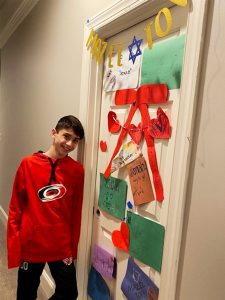
1. Usually, grandparents are not the primary caregivers for their grandchildren. We don’t have to manage the day-in, day-out rearing of grandchildren, including discipline, school matters, and social engagements. That means we can serve in a more neutral, supportive, and non-judgmental way than parents — and spend meaningful time together.
2. Grandparents are often their grandchildren’s biggest cheerleaders. We simply love our grandchildren for who they are.
3. Grandparents are typically more settled, with a less frenetic way of life. Many grandparents are retired from full-time work, have established deep (though perhaps smaller) social groups, have less day-to-day stress in their lives, and therefore may have more time and patience for thoughtful, attentive conversation.
B-Mitzvah Developmental Stage
Children preparing for B-Mitzvah are in a developmental stage often referred to as the pre-teen or tween years — typically nine to twelve or thirteen years of age. All pre-teens have the following in common: they experience significant physical, mental, and emotional changes as they approach and enter puberty.
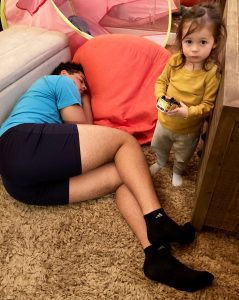
Some examples of changes are growth of body hair and onset of menstruation (physical changes), rebelliousness and changing interests or hobbies (mental changes), and mood dysregulation and the shifting importance of peer relationships (emotional changes).
This stage can be challenging for pre-teens and the adults in their lives. Pre-teens benefit significantly from having involved grandparents who love and accept them for who they are and understand what is happening to their grandchildren inside and out.
While parents, rabbis, cantors, religious-school teachers, and tutors are the formal figures in B-Mitzvah preparation, grandparents can play a less formal, yet key role, too. Building on the relationship they already have with their grandchildren, they can serve as supportive, trusted adults who are able to have a meaningful conversation during this pivotal developmental period.
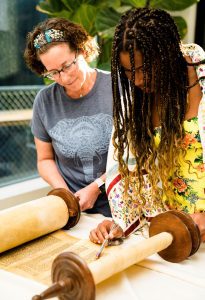
Below are three communication strategies to help grandparents have significant pre- and post- B-Mitzvah conversations and to create deeper connections with our grandchildren.
1. Try to be a sounding board.
Pre-teens live in a world of adults telling them what to do and they often feel there are limited opportunities to share their feelings and opinions. Your grandchild might want someone to just listen to what they’re experiencing. To draw out their thoughts about their B-Mitzvah experience, engage your grandchild with conversation starters that catch their interest and attention. Then, ask if they would like your input or feedback before offering it.
Ask, for example:
- “I’d love to hear how you are feeling about becoming a B-Mitzvah. Would you like to tell me a bit about that?” Follow up with, “What do you think you will say about this experience in five years?”
- “Tell me what surprises, challenges, or frustrations you have experienced since taking on the added role of B-Mitzvah preparation.” Follow up with, “Is there a way I might be helpful to you?” or “How can I help you address these challenges?”
- “What are your friends’ feelings about your spending extra time preparing for your B-Mitzvah?” Follow up with, “What do you think they would rather be doing with you?”
- “I know this has been a high stress time for your parents too; how do you feel things are going in the family since B-Mitzvah preparation began?” Follow up with, “What if I helped you plan a ‘let’s not talk about the B-Mitzvah’ evening out?” or “How about we plan more fun things, just you and me, to de-stress.”
2. Be open-minded and positive.
Pre-teens regularly hear critiques and judgements from adults and peers about the choices they make. This can sometimes lead them to doubt themselves and to question their own decision making. Having conversations that are affirming, supportive, and positive can enhance your grandchild’s self-esteem and build your relationship.
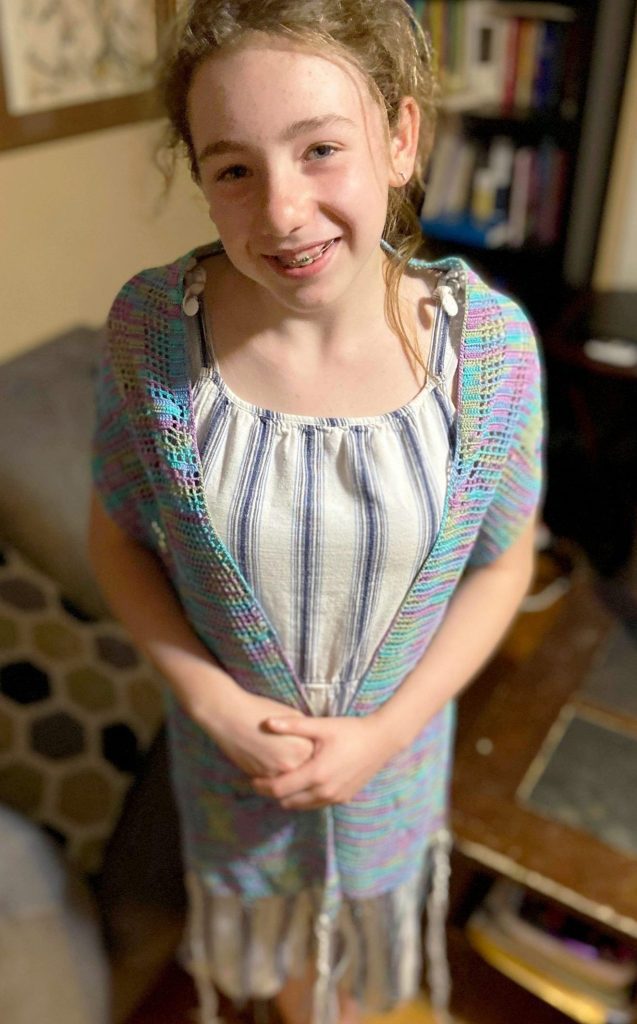
You might say:
- “It looks to me as if you are able to balance your B-Mitzvah requirements while keeping up with schoolwork, staying connected to friends, participating in extra-curriculars, and still managing your responsibilities at home.” Follow up with, “Is that the case? If so, tell me your secret to managing it all.”
- “Thank you for showing me a picture of the outfit you chose for the Saturday night party. I think that really expresses who you are.” Follow up with, “Was it difficult for you to make a decision about what to wear?” or “Do you think what I’ve chosen to wear is appropriate”?
- “I love how much you care about [animals]; tell me about your mitzvah project with the [Humane Society].” Follow up with, “Would you like me to support your work? How best can I do that?”
- “Your party theme is so creative. I appreciate your telling me all about it. I can see your personality shine through in the centerpieces for each table.” Follow up with, “Tell me about your role in the decorations and activities.”
3. Ask open-ended questions to promote a richer dialogue.
Typically, pre-teens would rather have conversations with their friends than with adults.
If you ask open-ended questions (what, how, who, where, and when) you’re more likely to stimulate in-depth and personal conversations. This can help your grandchild think more deeply about their life situations, while helping them build the part of their brain responsible for logical thinking, decision making, and risk assessment.

You might start the conversation by asking:
- “Who are the people you are most looking forward to celebrating your B-Mitzvah with?” Follow up with, “I’m curious, would you share what makes those people special or important to you or fun to be around?”
- “Which part of your B-Mitzvah are you most nervous about?” Follow up with, “What kinds of strategies do you have to help work through the fear/anxiety? If you would like suggestions, I am happy to offer some” or “Would you like to practice your Torah portion (or haftarah) with me or perhaps we can brainstorm ideas for your d’var Torah.”
- “In our tradition, Jewish children becoming a B-Mitzvah means that they are now considered an adult in the Jewish community. What does this experience (or rite of passage) mean to you?” Follow up with, “Would you like to talk about other ways you might contribute to the Jewish community over the next few years?”
- “In what ways do you think you might continue your mitzvah project after you become a B-Mitzvah?” Follow up with, “How can I support you in making these things happen?”
Keep in mind that your grandchild may not want to share deeper and more personal feelings; try to be understanding and supportive of that.
When you give your B-Mitzvah grandchild your full, loving, and nonjudgmental attention and interest, you may open the door to rich and memorable conversations that make your relationship even stronger than it is now.
Erica Hruby is a tween/teen expert with over 28 years of professional experience working directly with parents, grandparents, and tweens/teens in Jewish community, academic, and residential environments. Erica has an M.A. from Georgia School of Professional Psychology in Clinical Psychology with a focus on children and adolescents. She is the founder of Anchored Parenting, LLC (www.anchoredparenting.org) and serves as the Executive Director of JTEEN-Jewish Teen Education & Engagement Network, LLC- a national network of Jewish teen professionals (www.jteenprofessionals.org).
With gratitude to teen reviewers Liora Pelavin, Annelia Ritter, and Sage Vogelstein.
Photographic Credits
Banner photograph, grandmother and grandchild with Torah, and grandfather and grandchild with Torah by Sadie Braunstein
Photograph of teen standing beside decorated door by Debby Weiss
Photograph of teen sleeping on floor by Regina Wurst
Photograph of teen wearing a tallit by Debra Corman



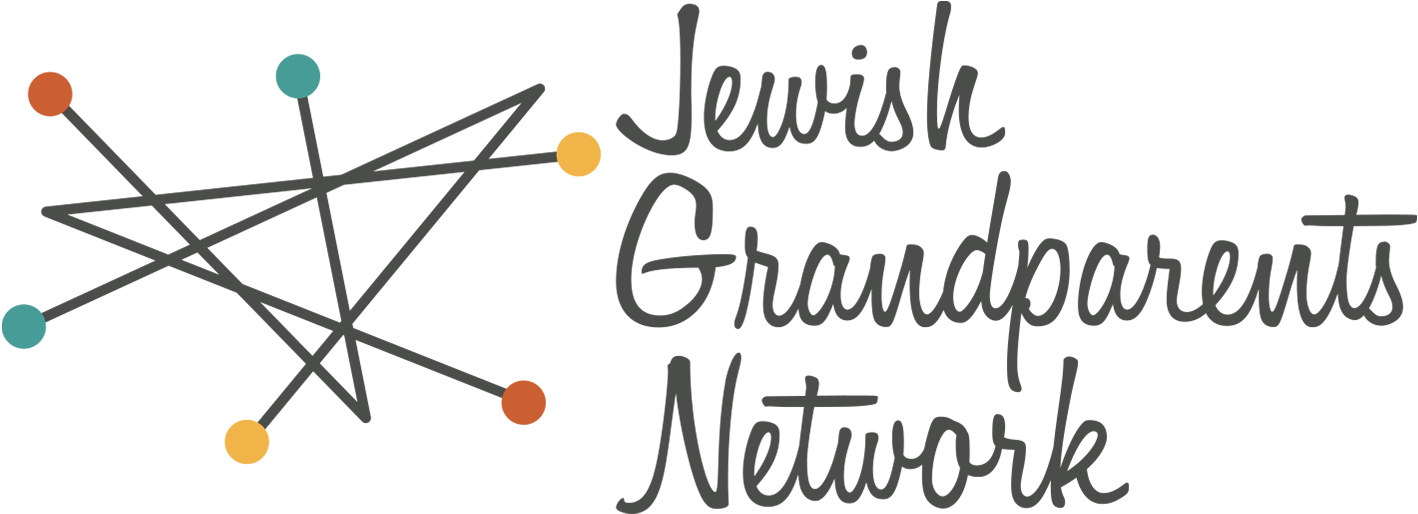
 We use technologies like cookies to remember your preferences. Consenting to these technologies will provide you with a better browsing experience. JGN never shares information about your use of our website.
We use technologies like cookies to remember your preferences. Consenting to these technologies will provide you with a better browsing experience. JGN never shares information about your use of our website.